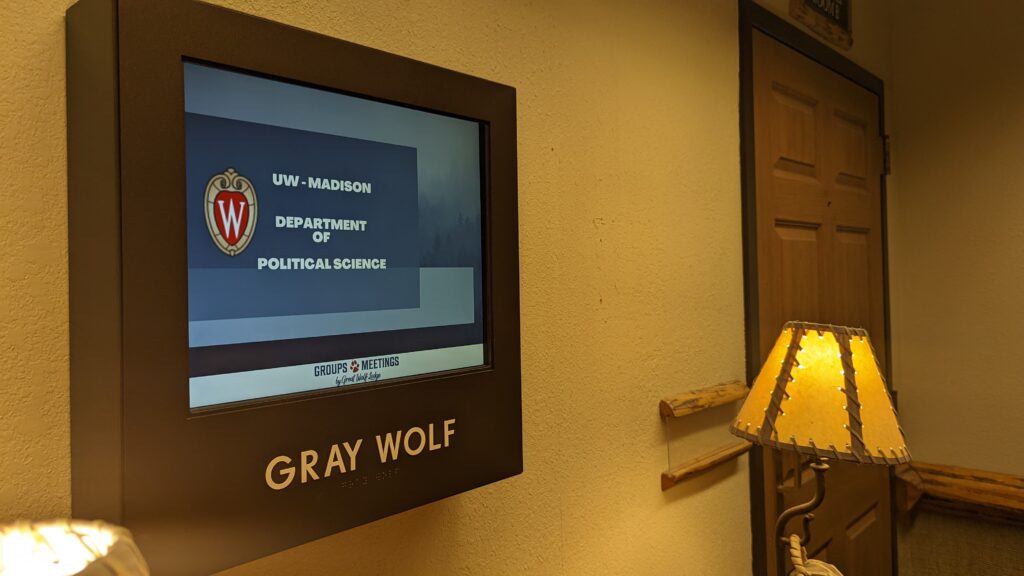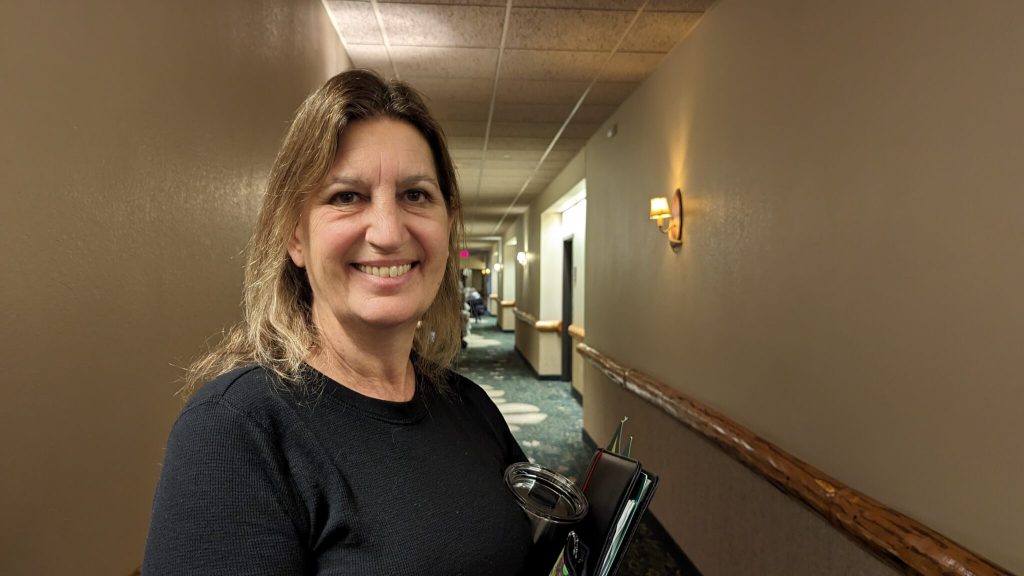Conservative UW-Madison Center Advises School Board Members
Bradley Foundation-funded center's symposium at water park excludes the media.

UW-Madison’s conservative Center for the Study of Liberal Democracy hosted school board members at the Great Wolf Lodge (pictured above) for a private symposium in December focused on their “rights and responsibilities”. Photo by Baylor Spears/Wisconsin Examiner.
School board members, dressed in business casual and carrying black folders, stuck out amongst the bathing suit clad families at the Great Wolf Lodge during a recent December weekend. While children streamed past, running towards the water slides, the school board representatives from across Wisconsin and other midwestern states walked past a “UW-Madison Department of Political Science” sign into a reserved meeting room.
“The effort is to say to school board members, ‘You got a lot of stuff in front of you, and we know that. How can you navigate that space to make sure that your school districts are doing what they can to educate our children and future citizens, to make sure that you have the tools to do that?’” said Ryan Owens, interim director of the Center for the Study of Liberal Democracy.
While framed as a simple civic engagement opportunity and chance for school board members to learn how to approach their position, the event showcased representatives of a growing movement to push boards in a conservative direction by advocating for “parental rights.”
‘A common culture based on fairness and understanding’
UW-Madison’s CSLD receives financial support from organizations dedicated to supporting conservative causes including the Lynde and Harry Bradley Foundation and the Charles Koch Foundation. Its mission is to “advance intellectual diversity” by defending free speech on campus, presenting programs on “religious and political freedom; the free market; educational reform; limited government” and other topics, and by “taking ideas seriously that we believe are not afforded sufficient consideration on campus” including “the various strands of conservative political thought and libertarian thought.” For the school board members who attended the symposium in the Dells, the group brought in a lineup of conservative speakers. Promotional materials advertised the symposium as an opportunity to learn about navigating controversial issues, promoting free speech and improving district transparency.
Symposium speakers included Robert Pondiscio, a school choice advocate and fellow at the right-leaning American Enterprise Institute; Cory Brewer, an attorney from the conservative Wisconsin Institute for Law and Liberty; and Jennifer Meinhardt, coalitions director for the conservative Americans for Prosperity Wisconsin.
CEO Bion Bartning started the organization in March 2021 after he disagreed with the curriculum on race being introduced into his children’s private school and found school leaders unreceptive to his criticisms. He said in an interview that he wanted to build an organization with an alternative philosophy for understanding and combating racism.
The group’s board of advisors includes figures like former Fox News host Megyn Kelly and human rights activist Ayaan Hirsi Ali. Since its founding, FAIR has filed an amicus brief in the Supreme Court lawsuit concerning affirmative action — urging the Court to side with the Students for Fair Admissions and writing that consideration of skin color can result in stigma, division, and dehumanization of applicants. Local chapters have challenged curriculum on race and gender in public schools.
Owens — borrowing language from FAIR — said the speakers shared a viewpoint of wanting “to promote a common culture based on fairness and understanding.”
Heather DuBois Bourenane, director of the Wisconsin Public Education Network, said she was frustrated to see a UW-Madison center sponsoring an event with such a clear ideological lean.
While the Center for the Study of Liberal Democracy might be seen as a small outpost of conservative thought in the left-leaning academy, “in order for academic events to have any kind of credibility, they need to have balance and demonstrate legitimate authority on the topic at hand. There’s no attempt at neutrality or expertise in this event at all,” DuBois Bourenane said. “The agenda reads like political theater.”
In a phone interview, Owens said in response to a question about how the Center tried to include a diversity of viewpoints in the symposium: “I guess my response is we reached out to people across the state without any preconceived notion about what their viewpoints may or may not be. I suppose if that’s something that’s of interest to people, we should be asking that question to UW centers that host events all the time. I’m not aware that other centers get asked or pushed on viewpoint diversity.”

A sign outside of reserved rooms at the Great Wolf Lodge. Photo by Baylor Spears/Wisconsin Examiner.
School boards have become a political hotbed
School boards throughout Wisconsin and around the country have become a battleground in recent years over mask mandates and curriculum on race, as well as gender and sexuality issues. The movement centered on these issues has targeted school board elections and meetings, which used to be dull affairs.
Wisconsin Republicans at a state and local level invested over $70,000 into school board races this year. School board members in Beaver Dam and Sparta resigned due to safety concerns after receiving threats, and others resigned after being targeted by conservative groups for recall elections. Not all recent recalls led to resignations. In the Mequon-Thiensville school district, four incumbents survived Republican-backed recall efforts.
Beyond elections, the movement in Wisconsin has affected school policies. A Waukesha teacher was suspended after displaying a pride flag in her classroom, and others in the district left due to new restrictions about what could be displayed or taught in the classroom. Several Wisconsin school boards are reviewing and removing books from shelves and others are passing policies that give parents say over what pronouns are used for their child in school.
‘We didn’t want to add other people into it’
Press was not permitted inside the sessions, including discussions about the First Amendment and transparency. Owens was also unenthusiastic about this Wisconsin Examiner reporter interviewing attendees in the hallway outside.
“So you’re just going to stay out here and pick people off as they come by and ask them questions?” Owens said while standing outside the White Wolf room at the resort.
Asked how the presence of the press would impede that goal, Owens said, “Frankly more than anything, we only had so much space, and we were at capacity already, and we didn’t want to add other people into it.”
In an earlier phone interview, Owens said that the Center planned for around 30 to 35 attendees. According to a list obtained via open records request, the final count of attendees, including Owens and the speakers, was 26.
Bill Lueders, president of the Wisconsin Freedom of Information Council, said the University community and the people of Wisconsin should be outraged over the exclusion of the press from the symposium.
“While the UW-Madison’s Center for the Study of Liberal Democracy is not a governmental body as defined in the open meetings law, and hence is not subject to it, it is absolutely deplorable that an outfit with this name and mission would be holding events for public officials from which the media is excluded,” Lueders said in an email. “What exactly is the Center telling these public officials that it doesn’t want the public to find out about?”
State open meetings law does apply to school boards, which are “governmental bodies.” The Wisconsin Association of School Boards explains in a primer on open meetings, “Whenever the members of a governmental body meet to engage in governmental business, be it discussion, decision or information gathering, the open meetings law applies if the number of members present is sufficient to determine the body’s course of action regarding a proposal discussed at the meeting.” Thus, any time half or more of the members of a school board meet, a public meeting notice must be issued. But there was not a majority of any one school board present at the symposium, excluding it from that requirement. The Hurley School board in northern Wisconsin and Hamilton Southeastern school board in Indiana both had two members in attendance, but in neither case did that constitute a quorum of members.
“I hope that, in the future, school board members and other public officials who receive invitations to these events refuse to attend unless they receive assurances that they are open to the presumably small numbers of journalists who may wish to be present,” Lueders said.
Model policies and a ‘pro-human’ philosophy
The process for inviting attendees was informal, according to Owens.
Many of the school board members in attendance were recently elected to their boards on parental rights and transparency platforms. They included Germantown school board member Russell Ewert, Menomonee Falls school board member Nina Christensen, who protested against mask mandates, and Dawn Lang, who was recently elected to the Hamilton Southeastern School Board in Fishers, Indiana and supported a now-failed bill that would have limited what teachers could say about religion, race and sex in the classroom.
Leslie Kolesar, president of the Hurley School District School Board in northern Wisconsin, attended the symposium with another member of the board. Despite being initially skeptical since she expected that the event would be partisan, she left with the impression that the two hosting organizations aim to promote respect for different ideas.
“It was a promotion of civil discourse, and also was a reminder to school board members that we are primarily serving students and their parents,” Kolesar said in an interview between sessions. “Do we serve the taxpayer? Yes. Do we serve other governing bodies? Yes. But our primary responsibility is to students and their parents to make sure when those kids graduate from high school, they’re ready to step into the adult world with the skills to make their way.”

Hurley School Board President Leslie Kolesar said the symposium was “a reminder to school board members that we are primarily serving students and their parents” during an interview at the Great Wolf Lodge. Photo by Baylor Spears/Wisconsin Examiner.
Brett Hyde, a school board member from Muskego-Norway, said he wasn’t sure what to expect from the symposium, but left with affirmation that the Muskego-Norway school board could make decisions regarding policies about students’ gender pronouns at school. The board recently advanced a policy change that would require parental permission before district employees can refer to students by their preferred names or pronouns.
“I’ve had a couple emails that have told me that ‘No, you shouldn’t be approving this. This is not part of your authority.’ When in fact — and it was reiterated to me at the symposium — that yes, indeed, this is our authority and this is our policy to make as we see fit,” Hyde said during a phone interview.
Hyde said his support of the policy stems from his belief that parents are the primary driver of a student’s education.
“During the pandemic, parents were able to see more about what their children were learning and those kind of developed into this parents-versus-teachers narrative that has been in the media recently,” Brewer said. “We wanted to create resources to help districts, help parents, help teachers kind of bridge that gap and be able to communicate more efficiently and enact policies that are pro-parents, pro-transparency, pro-community engagement.”
Brewer said members can introduce or make changes to the policies based on local needs.
WILL’s model policies focus on parents’ rights to view instructional and training materials, employee expression and the handling of controversial issues. Several of the policies are meant to help parents access school materials more easily.
Another policy that addresses student gender identity in school starts with the statement that “Parents have the right to determine the names and pronouns that staff use to refer to their children while at school.”
The model policy says that staff shouldn’t refer to minor students by a different name or pronouns that differ from their biological sex without written authorization from a parent. It also says that district staff may, but aren’t required to, inform parents if they believe a student is seeking to transition or is socially transitioning to a gender different from their biological sex.
WILL’s resources for parents includes an example “Parental Rights Notification Form,” which provides a format for parents to ask to be notified anytime race is discussed by their student’s teacher.
Michael Apple, a professor emeritus at UW-Madison whose work focuses on curriculum, instruction and educational policy, describes the history of the parental rights movement as coming from two conflicting sources: one strand includes people of color and other oppressed groups who demanded they be heard by mostly white school boards and the other is led by white people “who did not want their kids to feel any guilt or shame about the racist past of the United States.”
“One of the things that the right has done is make democracy into simply consumption practices. Schools are just like bread, TV sets. It’s individual choice. That motion towards individual choice means now kids are just seen as the property of parents,” Apple said. “The community has no say in it and as long as parents can say ‘no’ it’s perfectly legitimate for parents to have sort of gated communities so that any pollution — critical race theory, books about homosexuality or nonbinary stuff — anything about that has to be kept out.”
FAIR representatives at the symposium in the Dells promoted what they call a “pro-human” philosophy. According to the organization’s website, pro-human means “advocating for one human race, individual civil rights and liberties, and compassionate opposition to racism and intolerance rooted in dignity and our common humanity.”
Zander Keig, a social worker and transgender man, presented on FAIR’s diversity, equity, and inclusion training, which emphasizes looking at everyone as one human race. He said the training makes a point of not using affinity groups because that is a way of flattening and stereotyping people.
Describing people as members of a group “separates people rather than bringing them together. It creates more conflict than there was before because it brings up issues that get people upset in the workplace, and so their productivity is going to be affected by that perhaps,” Keig said. “Some people don’t like to be reduced to their race or ethnicity. Just because I’m Latino doesn’t mean I want to be sequestered off.”
Tanya Simons, who serves on the Osseo Area Schools Board of Education in Minnesota, was another of the FAIR presenters at the symposium. She said she started working with FAIR because she found it gave her the vocabulary she’d been looking for.
“I’m Mexican American. I grew up in northern Minnesota. FAIR is all based on our human identity that is broad and beautiful and many characteristics, and we promote that versus the current kind of direction of flattening us into race and gender,” Simons said. “When I encounter people, there will be a lot of assumptions about who I am and what I think and based on how I look, whereas, you know, I identified myself as a rural Minnesotan and I identified myself as a writer.”
Simons said part of her presentation included teaching school board members about how to engage with stakeholders whether it meant not “taking the bait” when arguments arise and exercising “moral courage.”
FAIR paid for the costs of in-state school board members, while the UW-Madison Center paid for out-of-state members and the speakers, according to Owens. The few attendees from outside Wisconsin, like Dawn Lang, were previously familiar with FAIR.
“It was just reaffirming the things that I’ve already read online,” Lang said, “and you know, looking at ways to bridge and unify our district.”
Conservative UW-Madison center holds symposium for school board members was originally published by the Wisconsin Examiner.






















Bradley foundation is long for the word treason.
The “Parental Rights Movement” is simply. a subterfuge to begin a conservative censorship on what is taught in public schools. If this movement takes hold across the State, we will see small groups of vocal, hostile and menacing parents intimidating school boards and dictating what will be taught and threatening any staff member who deviates from their doctrine.
A noted historian once said, “We should always beware that what now lies in the past once lay in the future.” Without trying to predict the future, there are already clear signs that two critical professions in our country are being ruined by the triumph of reaction, led by organizations like those mentioned in this article. And, that the view down the road in the rear view mirror will not be very flattering for these groups. The two are the teaching profession and nursing.
Schools of Education are already reporting big drops in enrolment, and teacher retirements are accelerating. But, school districts and know-it-all right wing boards will probably be able to find someone willing to teach that white people are still the #1/best race, that slavery really wasn’t that bad, and that transgender people are a threat to the American way of life.
Nurses across the country report being harassed and lectured by Fox News-informed patients and families about how to deliver care, and why Ivermectin will cure whatever it is. Finding the nursing equivalent to the right-wing teachers might be a little trickier. Especially if you are really sick.
It is important to note the activities of “FAIR” nationwide and the roots of this movement going back a century: “The fight to whitewash US history: ‘A drop of poison is all you need’ At least 15 states are trying to ban schools from teaching critical race theory and the 1619 Project. The reactionary movement stretches back to the 1920s and the KKK,” by Julia Carrie Wong, The Guardian, 25 May 2021 https://www.theguardian.com/world/2021/may/25/critical-race-theory-us-history-1619-project
The sponsorship of such events tells everything we need to know about the intended objectives, regardless of whatever
deceptive camouflage they’re wrapped in. We need only look at the spectrum of the other events they fund to understand
that their ultimate purpose is to maintain their status as latter day feudal lords…and at whatever cost is necessary, despite democratic interference.
nice photo of the G’Wolf lodge!